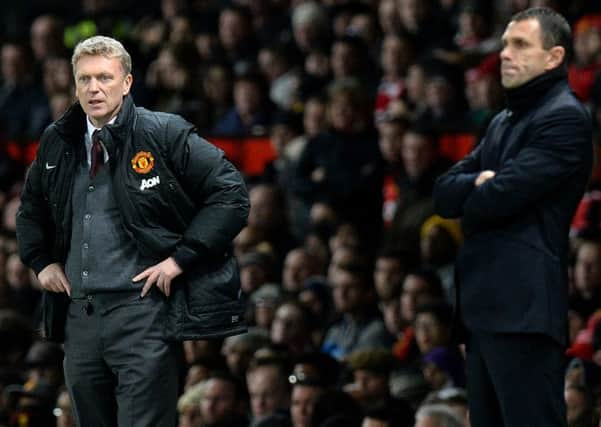Why David Moyes appointment will be third time lucky for Sunderland


Twelve months ago in Toronto, Ellis Short mingled fondly with Sunderland supporters, beaming with a smile stemming from Dick Advocaat’s restoration as Black Cats boss.
In a rare moment between him signing autographs and posing for photographs, I asked Short if he was relieved that Advocaat had returned: “Very,” he replied with a sigh of relief.
Advertisement
Hide AdAdvertisement
Hide AdShort and then director of football Lee Congerton were not convinced by any of the available alternatives to Advocaat after the ex-Holland manager’s initial decision to retire to the Dutch countryside.
Almost by default, Sean Dyche would have been the heir apparent to Advocaat and while the Burnley boss is highly-rated within football circles and has been on Short’s radar for several years, it would have been a tough sell to supporters from a PR stance.
The candidate that Advocaat recommended following his initial rejection and the one that Sunderland really wanted was David Moyes, yet the ex-Manchester United manager was off-limits.
Moyes was happily staying out of the limelight of the English press in northern Spain at Real Sociedad – ironically a club pretty similar to Sunderland; backed by a fanatical supporters, yet constantly struggling at the wrong end of the table.
Advertisement
Hide AdAdvertisement
Hide AdThe majestic seaside resort of San Sebastian gave Moyes chance to heal and experience a different kind of management after his selection as the heir apparent to Sir Alex Ferguson ended in such an ignominious dismissal.
The Scot wasn’t ready to return to the Premier League at that stage. Neither was he when Sunderland again came calling in October prior to the appointment of Sam Allardyce, even though there was mounting pressure at Sociedad which would see him axed a month later.
But this time it’s different. Moyes has been itching to return to the dug-out, as testified by his interest in the Aston Villa job earlier this summer. Wanting to take over at Villa Park at present is a mark of anyone’s enthusiasm.
When England first began to make overtures for Allardyce, Moyes looked the obvious contingency option and was a first point of call for Sunderland. It always appeared a good fit.
Advertisement
Hide AdAdvertisement
Hide AdMoyes was at the Stadium of Light for Sunderland’s draw against Crystal Palace last March, and during the FA’s dawdling during the last couple of weeks, he will have had chance to further familiarise himself with the situation he will inherit.
A coaching clinic in Jordan earlier this week proved a slight distraction, but doubtless, the Scot will have been taking soundings about Sunderland from elsewhere and been considering transfer solutions – particularly pressing when he has no time to waste on that score.
From a state of transfer deadlock, it would be no surprise to see Sunderland make a couple of quick-fire signings once the new manager is confirmed.
What Sunderland will hope is that Moyes can unearth more of the gems that he discovered during his 12 years at Everton; the likes of Tim Cahill, Phil Jagielka and Seamus Coleman, all signed for a relative pittance, who went on to be top Premier League performers.
Advertisement
Hide AdAdvertisement
Hide AdIt’s easy to see why that decade at Goodison Park makes Moyes so appealing for Sunderland.
That Everton side were everything Short and Sunderland supporters desire so much – a top half team, occasionally challenging for the top four and being doggedly difficult to beat.
There was only one relegation battle during Moyes’ time there. At present, Sunderland fans would take just one year without one.
Moyes was able to accompany shrewd signings with the promotion of homegrown talent, as Wayne Rooney, Leon Osman and yes, Jack Rodwell, all came through the Everton ranks.
Advertisement
Hide AdAdvertisement
Hide AdAfter Sunderland were promoted back to the Premier League in 2007, successive managers spoke of their desire to eventually emulate Everton, particularly when the Toffees continued their Midas touch over the Black Cats.
A 12 year wait for a Sunderland victory over Everton was only ended in Moyes’ final season at the club – the 1-0 Stadium of Light success under Paolo Di Canio which was to seal Premier League survival.
Moyes isn’t flawless. It was an impossible job for him in succeeding Sir Alex Ferguson, but there have been several well-documented complaints from Man United players over his coaching methods.
But it’s a completely different situation at Sunderland. There is no culture where players will moan “Sir Alex didn’t do it that way”.
No manager is here long enough to introduce such a system.
Advertisement
Hide AdAdvertisement
Hide AdShort hoped Allardyce would be able to break that trend, but a nine-month tenure was a pitifully brief stint for an experienced old head who promised so much.
At least, Allardyce has been able to lay a few foundations for Moyes to build upon – in fitness, scouting and analysis Sunderland are in a far better situation than they were last October.
Moyes will now get the chance to leave Sunderland in an even better state to his ultimate successor. Hopefully that’s several years down the line.